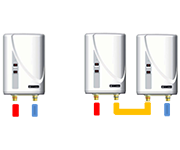Electric water heating is a popular and efficient way to provide hot water for your home. Whether you’re washing dishes, having a shower or doing laundry, an electric water heater can provide the hot water you need. This guide to electric water heating for homeowners will help you understand the basics, including the different types of systems available and how to choose the right option for your home.
How Electric Water Heaters Work
Electric water heaters use electrical resistance heating elements to heat water. These elements are typically located inside the tank for storage heaters, or in the water flow path for tankless systems. When the thermostat detects that the water temperature has dropped below a set point, it activates the heating elements, which then warm the water to the desired temperature.
Types of Electric Water Heating Systems
- Storage Tank Water Heaters – These are the most common type and consist of an insulated tank where water is heated and stored. They can provide hot water for multiple fixtures simultaneously and are simpler and more affordable to install. However, while they provide a constant supply of hot water, they can be less energy-efficient due to heat loss over time.
- Instantaneous Tankless Water Heaters – These heaters heat water on demand without the need for a storage tank. This type of water heater is more energy-efficient, as it only heats water when needed, reducing energy consumption and costs. However, they can have a higher initial cost and may require electrical upgrades for installation.
Choosing the Right System for Your Home
When selecting an electric water heater, consider the following factors:
- Home Size & Usage – For larger homes, a storage water heater might be more practical, as it can supply hot water to several points at once. For smaller homes or for homes with fewer occupants, a tankless system can be ideal due to its energy efficiency and compact size.
- Energy Efficiency – Tankless water heaters are generally more energy-efficient as they eliminate standby heat loss. Look for units with a high energy factor (EF) rating to maximise efficiency.
- Installation & Maintenance – Tankless units are compact and can be installed in smaller spaces, making them ideal for homes with limited space. They also typically require less maintenance compared to tank system with more components.
Which Option is Best?
While the best option for your home will ultimately depend on your specific requirements, tankless water heaters have gained popularity over tank water heaters due to their efficiency and convenience. They’re perfect for homeowners wanting a constant supply of hot water while reducing energy consumption. When choosing a tankless system, ensure it has the right capacity for your peak usage times.
Contact MicroHeat today for a more in-depth guide to electric water heating.



